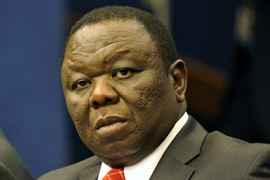Rights abuses ‘persist’ in Zimbabwe
Amnesty chief says violations still a problem as EU ties aid resumption to clear progress.

“Although the level of political violence is significantly less compared to last year, the human rights situation is precarious and the socio-economic conditions are desperate for the vast majority of Zimbabweans,” she said.
Reform failure
Failure to reform security services was an obstacle for the unity government formed in February between Mugabe and Morgan Tsvangirai, his former rival and the current Zimbabwean prime minister.
“As head of state, commander-in-chief of the armed forces and leader of the country for the last three decades, President Mugabe and those around him must have a special responsibility to rise to the challenge of delivering on the global political agreement and particularly on the hard core human rights issues,” Khan said.
She urged the unity government to commit to human rights reforms and make public statements urging their supporters against violence.
She said the power-sharing pact “provides a framework for change, but commitment to its implementation is not consistent throughout the government”.
Grim assessment
“The government must give as much attention to securing human-rights reforms as they are to seeking economic resources,” Khan said.
“The human rights assessment is grim but should not be used by donors to withhold funding that can make a difference to humanitarian needs.”
“We believe humanitarian assistance to Zimbabwe should be expanded,” she said, especially to support primary education.
 |
| Tsvangirai has said he is encouraged by the EU’s commitment to Zimbabwe [AFP] |
Khan visit was the first-ever by an AI chief, and Zimbabwe’s decision to allow her mission was seen as a sign of political openness.
But she said a climate of intimidation still pervades with human-rights activists and supporters of Tsvangirai’s Movement for Democratic Change (MDC) party were still being prosecuted on terror charges.
Seven MDC activists who disappeared last year have never been found, while as recently as Wednesday, protesters were beaten while carrying out peaceful demonstrations.
Khan is expected to meet Tsvangirai in London on Friday. She failed to meet Mugabe, who was a 1970s AI “prisoner of conscience” during his anti-colonial campaign.
Her findings came as Tsvangirai met European Union officials in Brussels as part of an international tour aimed at gathering support for his country.
Louis Michel, the EU humanitarian aid commissioner, said after talks with Tsvangirai on Thursday that Zimbabwe’s unity government offers a “unique political opportunity to see Zimbabwe re-engage with the international donor community”.
“But in order to kick start this re-engagement we need clear progress on certain sticking points,” he said.
EU’s demands
Michel called for an end to politically motivated violence and for security forces to come under government control.
EU officials also said they want to see improvements in the human-rights situation in Zimbabwe before the 27-nation bloc will restore development assistance.
Nevertheless, Tsvangirai said he was encouraged by the EU’s commitment to his country.
“Financial support will be essential. There is no doubt that Zimbabwe is coming out of a trough and that during this transition we need that support,” he said.
“The commitments are there. They are measured. They are phased, and I think it is a good incremental support that we are looking at.”